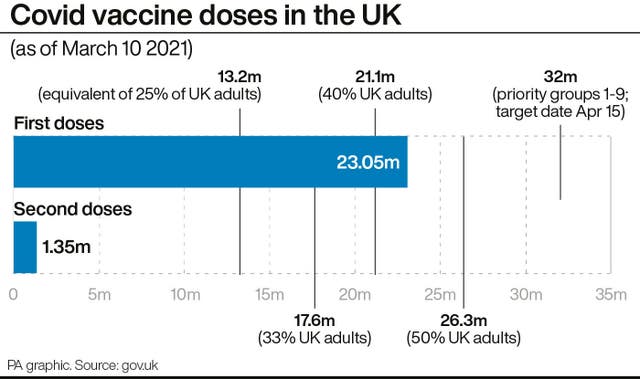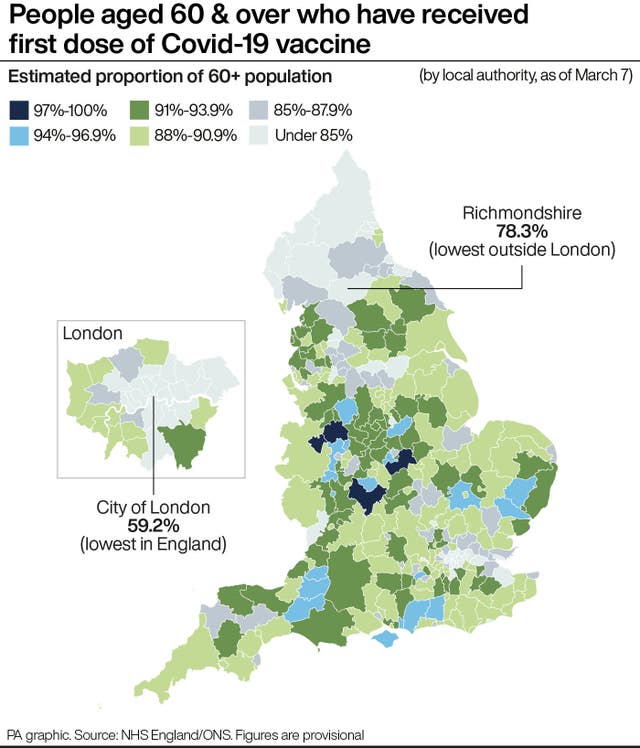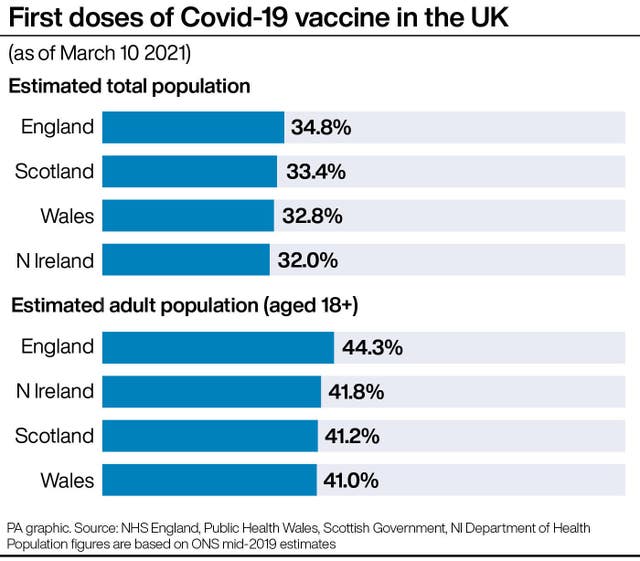The UK medicines regulator is urging people to continue having the Oxford/AstraZeneca Covid-19 vaccine, after a growing number of countries suspended its rollout over fears about blood clots.
Denmark, Norway and Iceland said they were temporarily halting all AstraZeneca vaccinations to investigate reports of blood clots among people who have had the jab.
Italy also followed Austria, Estonia, Latvia, Luxembourg and Lithuania in banning jabs with one particular batch of one million AstraZeneca vaccines, which was sent to 17 countries.
The UK’s Medicines and Healthcare products Regulatory Agency (MHRA) said there was no evidence to suggest the vaccine caused blood clot problems, and said people should still get their Covid-19 vaccine when asked to do so.
The European Medicines Agency (EMA) also backed the jab’s safety and said there had been just 30 reports of blood clots among close to five million people given the vaccine across Europe.
It said in a statement: “The position of EMA’s safety committee… is that the vaccine’s benefits continue to outweigh its risks and the vaccine can continue to be administered while investigation of cases of thromboembolic events is ongoing.”
Earlier this week the EMA reported that one person in Austria was diagnosed with blood clots and died 10 days after vaccination, but stressed there was “currently no indication that vaccination has caused these conditions”.
Another person was admitted to hospital with pulmonary embolism (blockage in arteries in the lungs) after being vaccinated.
Dr Phil Bryan, MHRA vaccines safety lead in the UK, said: “The Danish, Norwegian and and Icelandic authorities’ action to temporarily suspend use of the vaccine is precautionary whilst they investigate. Blood clots can occur naturally and are not uncommon.

“More than 11 million doses of the Covid-19 AstraZeneca vaccine have now been administered across the UK.
“Reports of blood clots received so far are not greater than the number that would have occurred naturally in the vaccinated population.”
Dr Bryan said the safety of the public always comes first and the issue was being kept under close review “but available evidence does not confirm that the vaccine is the cause”.
Professor Jon Gibbins, from the University of Reading, said blood clotting occurs for a variety of reasons and is naturally quite common, affecting one to two in 1,000 people in the general population.
He said it was understandable that some people may worry but there needed to be caution in suggesting a link between the vaccine and clotting.

Professor Anthony Harnden, deputy chairman of the Joint Committee on Vaccination and Immunisation, said: “Vaccine safety is critically important.
“Our UK regulator, the MHRA, review all reports of adverse events for both vaccines as they are reported.
“The public should have confidence that both vaccines used in the UK vaccination programme are safe and highly effective at preventing severe disease, including the prevention of blood clots caused by Covid.”
In a statement, AstraZeneca said patient safety was its “highest priority” and regulators have “clear and stringent efficacy and safety standards” for the approval of any new medicine.
“The safety of the vaccine has been extensively studied in phase three clinical trials and peer-reviewed data confirms the vaccine has been generally well tolerated,” it said.
Professor Stephen Evans, from the London School of Hygiene & Tropical Medicine, said: “There are a number of countries that have paused the use of the AZ vaccine, in some countries related to a particular batch.
“Genuine problems with a batch are very rare and almost always relate to contamination by bacteria or physical (eg glass) particles detected by the manufacturer.”

It comes as Public Health England (PHE) said four more cases of the P1 Covid-19 variant first identified in Manaus, Brazil, had been found in the UK.
Three in south Gloucestershire are all close or household contacts of the two existing P1 cases in the area, while one case in Bradford, West Yorkshire, involves a person who tested positive in late February after travelling back from Brazil via Paris.
Contact tracing teams have followed up close contacts of this individual and advised them to isolate and get a test.
The latest cases bring the total number of P1 variant cases in the UK to 10 – seven in England and three in Scotland, all of which have links to travel or to a previously confirmed case that has travelled to Brazil, PHE said.
Meanwhile, the European Medicines Agency has authorised Johnson & Johnson’s one-dose coronavirus vaccine for use.
The MHRA is considering its use for the UK.




Comments: Our rules
We want our comments to be a lively and valuable part of our community - a place where readers can debate and engage with the most important local issues. The ability to comment on our stories is a privilege, not a right, however, and that privilege may be withdrawn if it is abused or misused.
Please report any comments that break our rules.
Read the rules hereLast Updated:
Report this comment Cancel